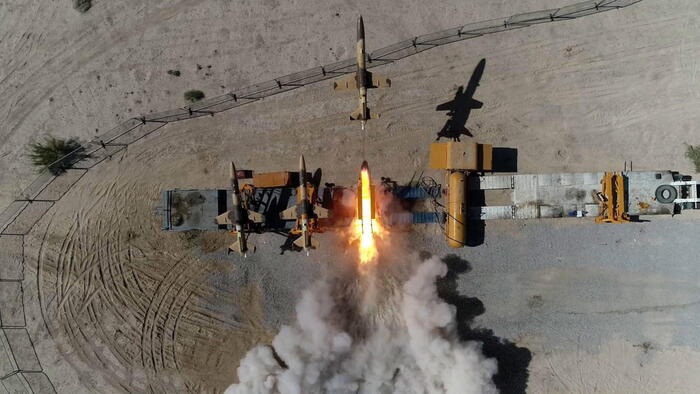Factors cited in The New York Times and estimated that Revolutionary Guards would try to carry out another cyber attack • Remember, Israel reportedly disrupted operations in a major port in Iran yesterday
New York Times report: After the Iranian cyber attack, intelligence officials estimate that the Revolutionary Guards are expected to respond to the attack, attributed to Israel.
Iran has launched a military satellite into space
The Washington Post reported that Israel was behind the cyber attack in the Iranian port on May 9, in response to the Revolutionary Guards attempt to penetrate an Israeli water facility. So far, Israel has not claimed responsibility for the attack on the port.
The cyber attack on Shahid Rajah's computing systems, Iran's main port, disrupted operations at the complex, creating delays in deliveries and traffic loads - but did not cause significant damage.
Recent cyber attacks between Israel and Iran have been recorded, and according to the New York Times, intelligence officials say the minor action in the port is intended to convey a message to Tehran that it will no longer target Israeli infrastructure.
According to the New York Times, there are intelligence sources who believe that Israel should not have retaliated against the Iranians because even if their attack on the water facility was unsuccessful, its impact was not very great.
However, after the Iranian attack was reported, officials in the Israeli government, led by Naftali Bennett in recent days as defense minister, assumed that Iranian civilian infrastructure should be reacted in a manner and leaked information about the operation to the media.
According to the New York Times, an intelligence official said that Israel hopes that the cyber attack in the port will end the cyber wars between Jerusalem and Tehran, but according to intelligence estimates, the Revolutionary Guards will likely attack back.
Iranian media first reported on Wednesday the cyber attack that paralyzed Shahid Rajah port in the southern state and even claimed it was a "Zionist failure".
While some media outlets have labeled "foreign reports" about an Israeli cyber attack, the semi-official news agency "Tasanim" has obtained internal confirmation that an attack did occur, but it failed. The agency quoted a senior port manager as saying that "there were some disruptions to the port's computer system last week, which was probably due to a cyber attack."
It was also reported in the news agency that "according to the relevant port manager Shahid Rajay, it was emphasized that due to the facility's passive defense system, the attack failed to interfere with the port's ongoing functioning."
More on:
• US report: Israel is behind Iran's cyber attack on Iran
• The cyber war comes up: Israel drew the red line
• Operations at the Iranian port have not yet returned to normal after the cyber attack attributed to Israel
Remember, the Washington Post reported that Israel and the United States carried out the cyber attack on Iran's port of Rajahid in the Iranian city of Bender Abbas, located on the shores of Hormuz Strait, on May 9. The Washington Post quoted US officials as saying the attack "Extremely accurate" that Iran was trying to hide its results.
According to the same factor, "complete disarray" was caused, and the published satellite photos also showed huge miles of traffic jams on the roads leading to the port. Cargo ships were also seen in the waiting area near the port in satellite imagery from May 12, three days after the alleged cyber attack.
Officials in the US and beyond have been quoted as saying that they believe the attack on the port was a reprisal for Iran's attempt to carry out a cyber attack on Israel's water facilities. "Updates that" Recently an attempt has been identified for a cyber attack on water control and control systems. The attack was handled by the Water Authority and the National Cyber Array. It should be emphasized that there was no damage to the water supply and it was conducted and conducted as a series. "In the same message, the Iranians were not mentioned at all.
As expected, no Israeli official referred to reports in the US, but the chairman of the National Security Research Institute and former Chief of Staff, Maj. Gen. Amos Yadlin, wrote in his Twitter account: "This seems to be an Israeli response to the Iranian attack on Israeli water and sewage systems." .
He added: "If Israel is the one responding to an Iranian attack aimed at civilian water and sewage infrastructure, Israel makes it clear that civilian systems should be left out of combat. This is a significant message about the Iranian economic system's vulnerability to Israeli cyber capabilities."
"Today," Yadlin said, "Iran's ability is one league below Israeli ability, because they seem to have entered Israeli water systems over the Internet, which is simpler than entering a system that is isolated from the Internet. They probably failed because of the defense."
He added that "the operation attributed to Israel makes it clear how vulnerable they are and therefore likely to transmit deterrence. Although, as you know, trying to get deterrence can also escalate. There is a risk of counter-Iranian reaction, but I think it is unlikely that they think what Happened to them. "









